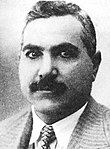Parliamentary elections were held in Iraq in 1925, the first under the 1925 constitution.[1] After the elections, Abdul-Muhsin Al-Saadoun became Prime Minister for the second time and founded the Progress Party to support the government and gain a parliamentary majority.[1]
| ||||||||||||||||||||||
All 88 seats in the Chamber of Deputies 45 seats needed for a majority | ||||||||||||||||||||||
|---|---|---|---|---|---|---|---|---|---|---|---|---|---|---|---|---|---|---|---|---|---|---|
| ||||||||||||||||||||||
| ||||||||||||||||||||||
Aftermath
editKing Faisal I wanted to remove Al-Saadoun from his office after he tried to reduce the king's powers; Faisal succeeded in persuading the majority of the Chamber of Deputies to vote for Rashid Ali al-Gaylani for speaker, rather than the candidate nominated by the Al-Saadoun government, resulting in Al-Saadoun's resignation. Faisal was also concerned that Al-Saadoun had too many allies in the British government and had the trust of the British High Commissioner,[2] so he made his two loyal men, Nuri al-Said and Jafar al-Askari, join the Progress Party and sabotage it.[3]
Further reading
edit- Faraj, Lutfi Jaafar. (1988). عبد المحسن السعدون: دوره في تاريخ العراق السياسي المعاصر. Baghdad: Al-Yaqatha Al-Arabiya Press. INLA 185609 (in Arabic)
- Mohammed, Alaa Jasim. (1990). الملك فيصل الاول: حياته ودوره السياسي في الثورة العربية وسورية والعراق 1888–1933. Baghdad: Al-Yaqatha Al-Arabiya Press. INLA 227541 (in Arabic)
References
edit- ^ a b Al-Hassany, Abdul Razzaq (1953). History of Iraqi Governments, Vol 2. Baghdad.
{{cite book}}: CS1 maint: location missing publisher (link) - ^ Al-Wardi, Ali (1976). Social Aspects of Iraq's Modern History, Vol 6 (2nd ed.). Baghdad: Al-Warraq for Publishing.
- ^ Al-Hasnawi, Qusay. "Has the Progress Party ended with Sadoun's death?". Al-Mada. Archived from the original on October 13, 2016.

